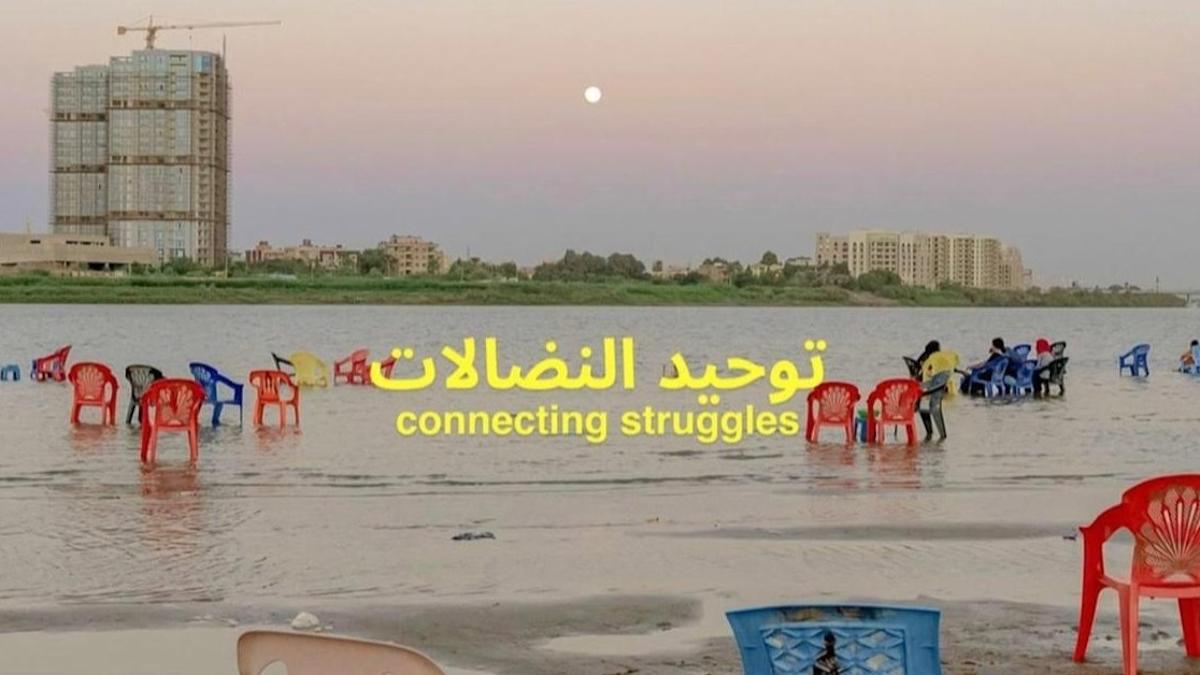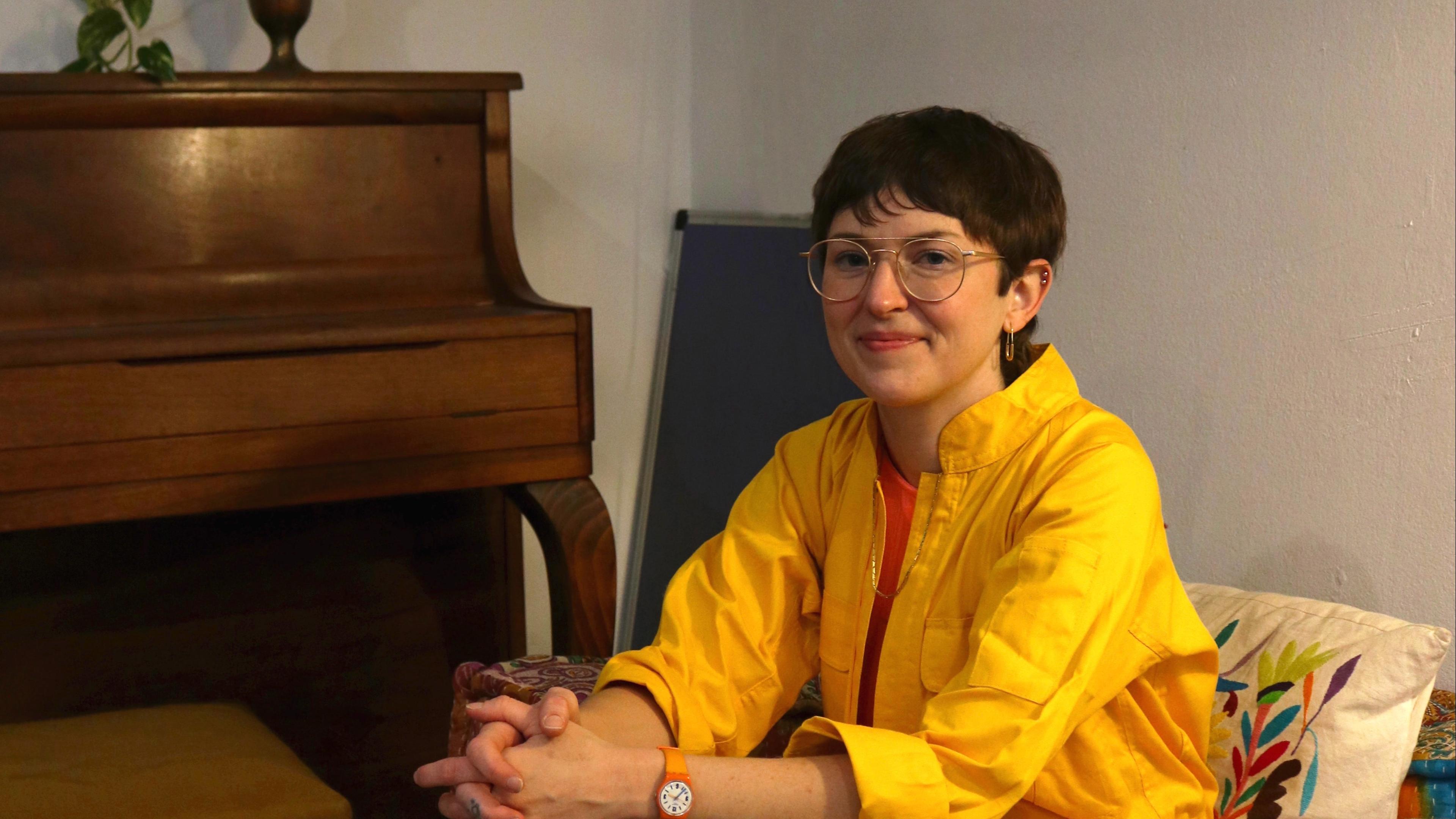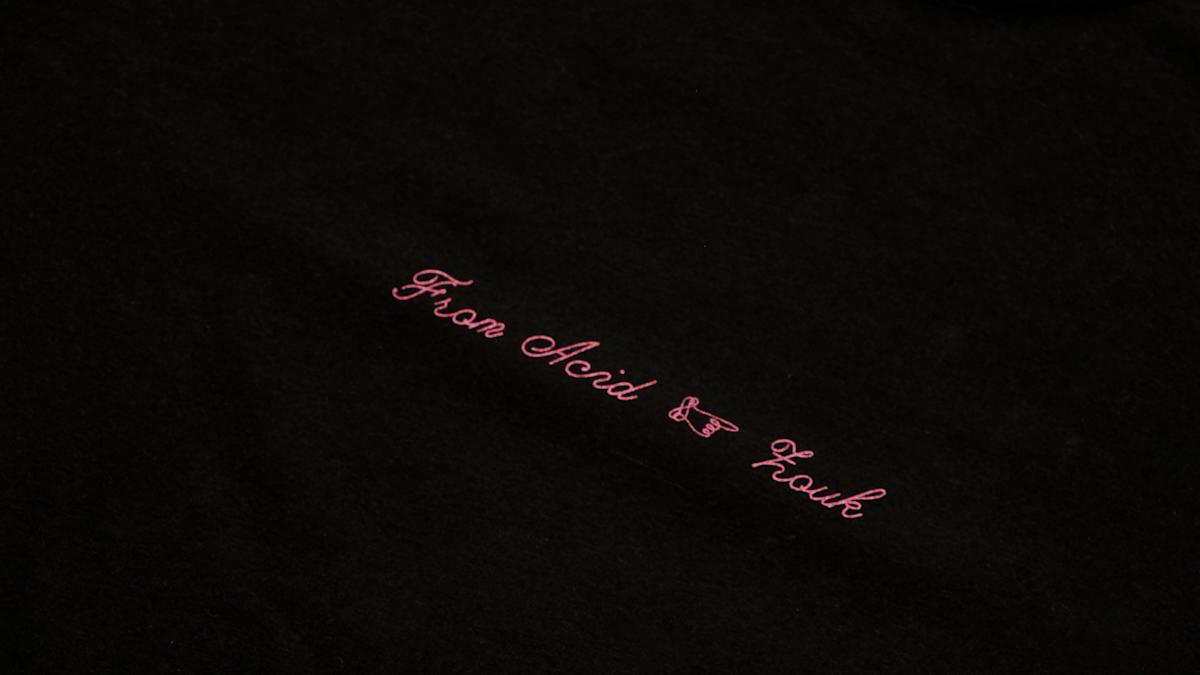
moe. and Acidfinky to host a fundraiser for Sudan and Palestine
Come down next Wednesday, December 10th.
Loading

The aequa co-founder and Refuge Worldwide resident discusses how we can support each other and work in solidarity with marginalised people through difficult times.
By Veronika Kailich
At their new aequa headquarters, based in Wedding, Sarj co-creates spaces for mutual support and solidarity.
Comprising a group of facilitators and workshops, aequa offers education and growth around topics such as allyship, unconscious bias, conscious communication, equitable organising practices, inclusive organisational design and more. The income from these workshops—as well as income from co-working and space rentals—is what keeps it running.
Hey Sarj! The last time I saw you on 6 November, you were preparing for the grand opening of the aequa space. How did it go?
I would say it was as we wanted it to be—it was less grand and more cosy, warm and small. You know, I don’t know that "grand" was ever our vibe, but it felt like sort of a family reunion without all the drama. A lot of us in the community have spent a lot of time together online or in really small groups, distanced throughout the last year, and so it was really beautiful to be able to finally gather a bigger group in person to feel each other’s presence physically and just share the space together. Just unpacking that with everyone has been a joy. Sitting in the room and cutting paper, making a zine about social equity; or the little corner where people are colouring the queer animals colouring books; or in the evening singing karaoke together, which we talked about way before the space was even open.
There was a moment where everyone was shouting each other out for their achievements in the pandemic, whether that be a big hurdle like publishing a master’s thesis or changing out of a toxic job, or leaving a toxic relationship, or just making it through the day-to-day stuff. It was just an incredibly special experience and we were really thankful. We were able to COVID-test everyone coming in so that even some more high-risk people in our community could also join us and feel safer.
You were dressed so colourfully at the opening, just like the space itself. Are vibrant colours a big part of aequa’s inclusive identity?
I would say that aequa is quite colourful and our community is quite colourful. Berlin has enough grey and darkness. I think for a lot of us, where it comes from is, “How do we survive these winter months together?” I do think it is a reflection of who we are as a community, in terms of who is attracted to the space. We’re kind of like a patchwork family. We’re tied together less by any specific one identity, or identity traits, but by a shared set of values and the belief that the world can be better and safer for more people, and that we each have a role to play in that. So letting each of our individual colours shine, but at the same time, recognising that there are a lot of colours in the proverbial crayon box and that each one is equally worthy and beautiful.
It’s a funny thing that even with some of the organising stuff, we’ll find that there are big disagreements about colours to use—for a flyer, for instance. We’ll have to do consensus-processes around something as silly-seeming as colours, because culturally they mean such different things to different people. The more diverse any community is, the more of those difficult conversations happen where you’re trying to find consensus or a common thing that you can share. The more we get into a democratised and consensus-based framework, the more we have to have a looseness to accommodate different ways of being and understanding, on everything from the colours to the words and language you use to describe something to try to find a middle ground that will serve as many different kinds of people as possible, while still being respectful and inclusive for many different kinds of people.
For our readers, could you give a brief run-down of your background and how your interest in mutual aid, community-building and intersectional feminism blossomed?
I think like so many people that are interested in these things, it came from a lived experience. I didn’t have any kind of academic connection to them. I guess my family and I are even part of mutual aid networks, if you could call them that, for as far back as I can remember (even though I learned that term in my 30s). It’s really nothing more than person-to-person support networks, and these have existed for as long as we’ve had communities. There were years for me personally where my family really depended on community to get through particularly hard times. I’m not religious now, but the church that I attended as a pre-teen and teenager in Texas, where I grew up—which is on un-ceded Wichita indigenous lands—is really where I learned about mutual aid and community care.
My parents separated, and at that time the church provided my freshly-single mom and all five of us kids with a support system. I’m the oldest of five, and I watched the way my mom also built support networks with other single parents, of which there were not many in Texas at that time. This could mean taking care of each other’s kids while you went to work, or passing along job opportunities for a gig on the weekend. Or you could do catering and make a few bucks. It could be literally sharing an extra frozen lasagne with the mom down the street, or letting them come use our washing machine when it was working, or borrowing each other’s cars. It was very practical the ways in which we were supporting each other—a very practical love.
I think even though there are certain aspects of that religious upbringing that I am trying to unlearn and leave behind, especially the shame aspects of it, there is so much that I am thankful for … that this church and this general mutual aid network of single parents and single parent families was the place where I learned to love both strangers and community in really practical ways. I learned that we are all equally worthy of love, of safety, of dignity, of respect. Regardless of where we come from, where we live, who we love, how we love, how our brains are wired. It taught me what are now the hallmarks of transformative justice as well. This movement that I still subscribe to today, this belief that we all have the possibility to grow, transform and change. None of us dropped into this world an intersectional feminist. We were dropped into systems wherein we were either oppressors or the oppressed. It’s a lifetime of trying to unlearn those things. I’m very thankful for those experiences and I do think that they feed into what aequa is today.
aequa was founded to provide equal access to mutual aid services for marginalised communities. Can you illustrate how the intersectional nature of oppression systematically impacts these communities, and how spaces such as yours can help?
With mutual aid, this is a practice and a culture that comes directly from marginalised communities. They’re the ones who have been doing this since time immemorial, and I think it’s this practice of coming together to support each other where our governments or institutions—the so-called non-profit industrial complex—are failing us, leaving gaps of care. And it’s filling in those gaps.
I think mutual aid is based on this belief that we’re the ones we’ve been waiting for. We can take charge of caring for each other. I think space in particular is a really interesting example of a resource, similar with funding, where if you are someone who is more marginal, if you have different intersecting oppressions (you might be a Black trans woman, or a trans woman of color, you might be disabled, or neurodivergent. Each one of these oppressions compounds the others), the community space of aequa, while it is a community space that is open to people of all different kinds of experiences, we really try to make sure we run it in a way where there is priority given to those who might not have access to spaces otherwise.
Think about Wedding vs. Neukölln as one example. That was why it was attractive to go and take over the be’kech space in March of 2020; there are a lot of amazing community spaces that are already happening in Neukölln, and people who live there have access to those spaces. And in Wedding there are simply fewer of these kinds of queer feminist spaces on the map. So it was really exciting for us to be a part of that. We're also making sure that we're not giving to everyone equally—that would be social equality. We’re really thinking about social equity: We’re giving to everyone based on their needs. So this is where things like sliding scale prices come into play. It's also why we do a lot of barter arrangements. If someone doesn’t have funds to be a coworker, but they have time, experience or wisdom to give, we want them to come and have that exchange in whatever way is possible and meaningful for them.
I think that’s also in a way part of the reason why we also strive to have a truly diverse community, not only in terms of marginalisations that people experience, but also privileges. My co-organisator, Kes Otter Lieffe, always tells this joke about how mutual aid is usually the same 10 poor people passing around the same €5 in the same circle forever. While there is a beauty in that, and in the way that we as marginalised people show up for one another, to borrow words from adrienne maree brown, “if you’re good, say you’re good.” Because if we’re all bad all the time, then there’s not enough good to go around. It’s about this equilibrium that we’re trying to achieve. There will be moments where you have privilege or access or money, or time that someone else in the community doesn’t have access to at all or in that moment. And so you give into this community with the trust that when you need something—friendship, emotional support, child care, advice, whatever it might be—that that’s going to come back to you in some way. It’s less about creating these person-to-person transactional barter systems than it is about a ground-swell of give-and-get of continuous exchange. In that sense, we really try to focus, as Dean Spade said, on “solidarity, not charity.” It’s not about an institution giving out handouts: It’s about people supporting each other.
If I could just add one more thing, part of that solidarity work and the work of anti-oppression learning and unlearning, in general, is what happens in aequa's Workshops Collective. This is a group of facilitators with different experiences who are committed to helping individuals and organisations recognise and dismantle the systems that we’re born into: systems of racism, ableism, classism, cis-sexism, colonialism capitalism, ableism, etc. There are so many of these systems that we’re born into that put us at odds with each other, many times in life-threatening ways. Part of the work of that collective is going out and teaching things like unconscious bias, conscious communication, equitable organising practices. The income that we earn from that actually makes it possible for us to pay the bills of the space, and at the same time make that space available for free to the groups that are doing the movement work that we really care about. It’s this redistribution that’s happening. As people are learning (or unlearning) the work of systemic oppression, learning ways to work against it, that income is then funneled into the space to the people who are doing that dismantling work—for example, organising solidarity demos or hosting mutual support groups.
Do you have any hopes or goals down the line to grow aequa into a larger network that extends beyond Wedding?
We existed online and hosted in many different locations in the city before we got this space in Wedding. In general, it is quite an international community online. Even in Berlin, there are people who will show up online who could never come into a physical space. Whether that’s because of physical disabilities, or high sensitivity, or neurodivergence—there are many reasons someone might not be able to or want to come to the physical space. So yes, there’s the online aspect of it which we keep for access reasons.
Then there is the possibility of other spaces. One of the things we talked about was using an orchard model. We had these ideas that we’d cultivate in a specific location in Berlin that would be kind of a cooperatively-run community space. If we could pull it off, then the idea would be to take that fruit and see if we could grow it in another context. We’re still in the "sapling phase," trying to make sure this tree can make it through a very difficult winter of the pandemic. Whether it’s called aequa or something else, the idea is that little manifestations of this could exist in many different places.
Are there any resources, organizations or individuals you’d like to shout out to our readers who’d like to learn more or are in need of mutual aid themselves?
For mutual aid, there are so many resources online and organisations who have been doing this stuff for years and years. We learned from them. If you’re thinking of consensus-organising, there’s an organisation called Seeds For Change that has a lot of great resources about that. To focus on Berlin, I would say at this moment, there are so many amazing groups that are organising. The ones that are inspiring me right now are Queer and Trans Mutual Aid Berlin, Women in Exile, International Women Space, Sex Worker Action Group Berlin, Deutsche Wohnen Enteignen, Casa Kua, LOOM eV and Berlin Collective Action eV (disclosure: I was a founding member, although I don’t have capacity to be active at the moment).
Is there anything else that you’d like to mention or expand on before we wrap up?
I guess it’s mostly an invitation. This space exists in and for the community, so if you are an organiser, you can go to our website to apply to use the space for your initiative (whether that’s climate action, sex workers rights organising, anti-racism work, etc.) for free. If you’re someone who has access to funds, such as at your company, and if you think you need diversity and inclusion training or if you need a space to rent for your meetings, all those sources of income make it possible for us to provide the space for free to the movement folks and folks with less access to spaces and resources.
Discover more about aequa on their website and Instagram. You can support their efforts on Patreon. Learn more or book a workshop at http://aequa.cc/workshops.

Come down next Wednesday, December 10th.

This week: Gaza Biennale, embodiment workshops, listening sessions

Out now, featuring every genre we've ever had on the radio.